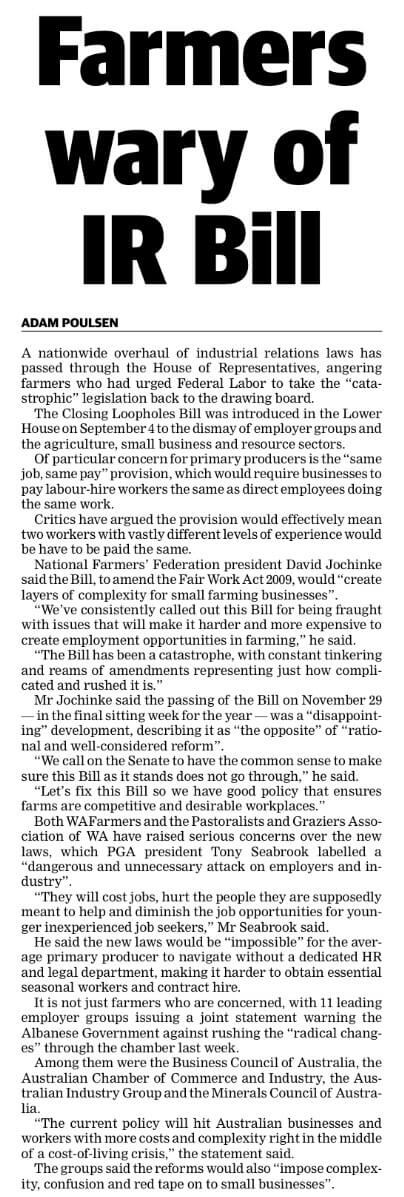

Article by Adam Poulson courtesy of the Countryman.
A nationwide overhaul of industrial relations laws has passed through the House of Representatives, angering farmers who had urged Federal Labor to take the “catastrophic” legislation back to the drawing board.
The Closing Loopholes Bill was introduced in the Lower House on September 4 to the dismay of employer groups and the agriculture, small business and resource sectors.
Of particular concern for primary producers is the “same job, same pay” provision, which would require businesses to pay labour-hire workers the same as direct employees doing the same work.
Critics have argued the provision would effectively mean two workers with vastly different levels of experience would be have to be paid the same.
National Farmers’ Federation president David Jochinke said the Bill, to amend the Fair Work Act 2009, would “create layers of complexity for small farming businesses”.
“We’ve consistently called out this Bill for being fraught with issues that will make it harder and more expensive to create employment opportunities in farming,” he said.
“The Bill has been a catastrophe, with constant tinkering and reams of amendments representing just how complicated and rushed it is.”
Mr Jochinke said the passing of the Bill on November 29 — in the final sitting week for the year — was a “disappointing” development, describing it as “the opposite” of “rational and well-considered reform”.
“We call on the Senate to have the common sense to make sure this Bill as it stands does not go through,” he said.
“Let’s fix this Bill so we have good policy that ensures farms are competitive and desirable workplaces.”
Both WAFarmers and the Pastoralists and Graziers Association of WA have raised serious concerns over the new laws, which PGA president Tony Seabrook labelled a “dangerous and unnecessary attack on employers and industry”.
“They will cost jobs, hurt the people they are supposedly meant to help and diminish the job opportunities for younger inexperienced job seekers,” Mr Seabrook said.
He said the new laws would be “impossible” for the average primary producer to navigate without a dedicated HR and legal department, making it harder to obtain essential seasonal workers and contract hire.
It is not just farmers who are concerned, with 11 leading employer groups issuing a joint statement warning the Albanese Government against rushing the “radical changes” through the chamber last week.
Among them were the Business Council of Australia, the Australian Chamber of Commerce and Industry, the Australian Industry Group and the Minerals Council of Australia.
“The current policy will hit Australian businesses and workers with more costs and complexity right in the middle of a cost-of-living crisis,” the statement said.
The groups said the reforms would also “impose complexity, confusion and red tape on to small businesses”.
















